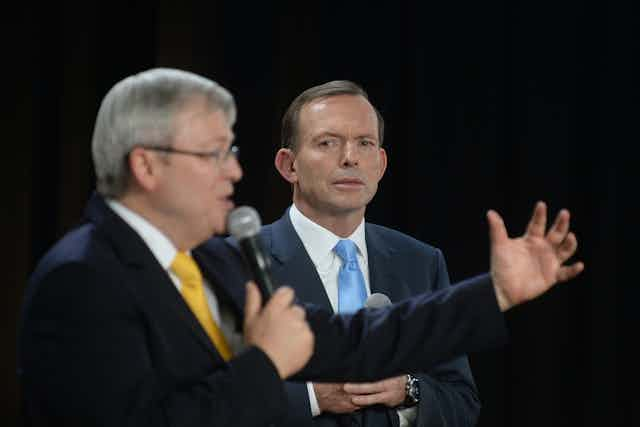The idea a politician’s face would influence our vote one way or another seems preposterous: who would be swayed by something so seemingly trivial, so manifestly beside the point? But looks, alongside other considerations, matter.
In one version of an ideal world – let’s call it Cerebralia – political campaigns would be dry, dispassionate affairs. Candidates would be ciphers, mere mouthpieces for their party’s message. Policy debate would be reasoned and evidence-based. People would decide how to vote following a rational and informed assessment of party platforms. Nothing as slippery as emotion or personality would disrupt the cool logic of political deliberation.
The real world of political campaigns is rather different. Debate pulses with feeling. Partisans defend their positions with self-righteous anger and pour scorn on opponents. Falsehoods are peddled to sow fear and doubt.
The media salivate whenever a candidate’s true self seems to break through their carefully managed image. We speculate endlessly on the character of our would-be leaders.
In theory, politics may be a reasoned contest of ideas, but in practice it is an emotive contest of personalities. Appearance matters in the impressions we form of candidates, and the face perhaps most of all.
Their backers may be faceless men and women, but candidates are not. Although it has been said that politics is showbiz for ugly people, how candidates look can have a considerable impact on their appeal to voters.

The face is a screen on which we read the shifting plays of emotion and the enduring signs of character. People form impressions of personality traits such as trustworthiness and competence in as little as one tenth of a second.
These impressions are formed preconsciously, too rapid to be reasoned. Longer inspection of faces doesn’t so much alter our instantaneous personality judgements as increase our potentially misplaced confidence in them.
Different facial aspects convey distinct personality impressions. People infer positive traits from attractive faces, the so-called “halo effect”. Baby-faced individuals, with rounded features, large eyes, thin eyebrows and small noses, are judged to be honest and dependable.

People with prominent brows and jaws and angular features are perceived to be dominant and forceful. Those with relatively wide faces are seen as intimidating, and there is evidence that they are, in fact, more likely to behave in aggressive and prejudiced ways.
Alex Todorov and his colleagues at Princeton University have shown how these facial impressions play out in the political arena. In several studies they have demonstrated that candidates whose faces look competent enjoy an electoral advantage.
In the first study, in 2005, participants rated the competence of US Congressional candidates who were running against each other, after viewing their faces for one second.
Higher-rated candidates won 69% of their races. This powerful facial effect was independent of the candidate’s gender, race, age, media familiarity and incumbency.

Later studies have extended this surprising discovery. One study in 2010 showed that more threatening or dominant-looking candidates tended to lose US House and Senate elections. It also showed that facial competence judgements made in only 33 milliseconds could predict election outcomes.
Another study found that candidates in conservative electorates received more votes if they looked stereotypically Republican.
Similar findings have been obtained around the world, suggesting that they do not reflect the unique image-consciousness of American politics. For example, competence ratings made by Swiss children predicted the success of candidates in French elections.

These findings indicate that electoral results can be predicted by superficial, blink-of-an-eye impressions of faces, drawn by people who know nothing about the candidate’s ideology, policies or record.
Facial attractiveness may matter as much as competence and dominance. Although people tend to judge people with attractive faces to have appealing personalities, striving for attractiveness can also have its downside.
A 2009 American study found that people who focused on Sarah Palin’s appearance were more likely to judge her as incompetent and less likely to vote for her.
One study that demonstrated an electoral advantage for facial competence also found that candidates with more attractive faces were less likely to be elected, again because they were perceived as lacking competence. And of course, politicians who attempt to beautify themselves run the risk of character-baring spats with make-up artists.

So how do these facial politics bear on our aspiring prime ministers? Kevin Rudd has the prototypical baby-face: round as a clockface, with a dainty nose and a boyish hairstyle.
It is no accident that cartoonists often liken him to Tintin or the moon. Babyfacedness seems to be an electoral mixed blessing for male candidates, associated with lower competence (bad) but high approachability (good).
This contradiction might shed some light on the polarised public opinion that Rudd has inspired.
Tony Abbott’s face has more signs of dominance. It is leaner and more angular. Arguably it is an appropriate face for a muscular conservative. Labor’s campaign strategy appears to be to picture him as aggressive and threatening, playing up the dark side of dominance.

Their advertisements, such as “If he wins, you lose”, sometimes picture his head tilted forward, conveying an air of menace that a recent study suggests is caused by an apparent widening of the face.
Of course, voting decisions should reflect something deeper than an intuitive impression of a candidate’s face. But as Australian politics becomes increasingly presidential, focusing on the personalities of leaders over the policies of parties, the importance of appearance will only grow.
This trend may be especially strong among less informed and more TV-saturated voters, who have been shown to be more influenced by candidates’ appearance.
As Machiavelli wrote, “men in general judge more from appearances than from reality”. That’s a fact we must face.

